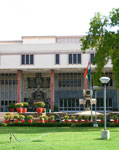
The Delhi bar council has become embroiled in controversy about whether there is a right to hereditary succession following the demise of incumbent chairman KK Sareen last month, as Luthra & Luthra lawyer Vijay Sondhi has continued his unrelated letter-writing campaign against the bar council's "mess".
Incumbent chairman KK Sareen passed away last month, which opened a vacancy on the currently 24-member Delhi bar council that a group of members have proposed should be filled by the late chairman's son Aman Sareen.
D K Sharma, who came twenty-sixth on the preferential voting list in the Delhi bar council election last year, has filed a writ petition in the Delhi High Court seeking to set aside the co-option of Aman Sareen.
Aman Sareen was appointed to the council by resolution within a week of his father’s death.
The writ petition was placed before justice Murlidharan on 4 August and an order was passed directing the Delhi bar council to frame guidelines on the rules of co-option of a candidate in case of the death or resignation of an existing member.
Rules of succession
According to D K Sharma, the former chairman’s son Aman Sareen was selected despite not having contested in the bar council election in the first place.“The Bar Council of Delhi has an election tenure of five years and there are 25 members to be elected,” said D K Sharma. “The method is that all the voters will vote in the preferential system and there is no direct voting and then in order of priority a list is prepared.”
This time 129 candidates contested, preferential votes were counted and the 25-member list was drawn up with the rest having been left waiting, added D K Sharma. “I was 26, and could not make it.”
Sharma told Legally India that the vacancy should be filled by rules of co-option: “The Delhi bar council is silent on these rules and you have to be governed by the BCI rules.” He claimed that section 4C4 of Part III Chapter 2 set out the rules for co-option as being in accordance with section 32B of the Advocates Act, which in turn said that any election for co-option will be by single transferable vote and there should be no question of voting for any member who has not contested.
Ex-chairman and member of Delhi Bar Council Ved Prakash Sharma said: “We are meeting on 8 August to discuss the co-option of Aman Sareen and after democratically deciding on that we will hold an election on 9 August.”
“All our proceedings shall happen in accordance with the law by the majority voting of a full house meeting. Rule 31 of the Delhi Bar Council permits us to co-opt a member and we are within power to select. In the past also we have co-opted in favour of member who had not contested in the election, which is proper and legal,” added Ved Prakash Sharma.
Lack of transparency 'appalling'
Meanwhile, Luthra & Luthra partner and Delhi bar council member Vijay Kumar Sondhi has continued questioning the internal elections of a number of members to various positions in the Delhi bar council and alleging irregularities.Over the past months he has written a number of letters to the bar council, including applications under the Right to Information Act 2005 to obtain information whether the appointment of Nitin Alhawat as honorary secretary of the bar council was correct under the rules.
"It is absolutely necessary that the impeccable credibility that this institution stands for is restored at the earliest. We have to be transparent in the way our day to day affairs are carried-out,” read Sondhi’s letter dated 9 July.
"However, the lackadaisical approach with which the affairs are being carried out is appalling to say the least. I would request all my colleagues to put their heads together and guide this institution out of this mess. Last but not the least, I feel that 'Our whole philosophy should be one of transparency'."
It is understood that Sondhi's contentions have not yet been addressed. Sondhi declined to comment.
threads most popular
thread most upvoted
comment newest
first oldest
first
Whant next, the AG/ SG asking for theri kids to 'inherit' their constitutional positions? We really dont like us being a democratic country?
My question is: is it justified that son can continue in the chamber of father , after his demises passing all other eligible lawyer are right? This rule is not discriminatory? Is it not creating uneven playing field? Can any one is entitled to have chamber even if he has practice of one/few year(s) merely because his father has one?
Now it is well know and acepted and established saying among legal fraternity that Judges and top Senior lawyers are new caste in the Indian society where their ward will also get same post as hereditary right to the post . In many families every generation is becoming judges and now even in high court we can predict who is going to be the Judge in coming years, this is giving very depressing and wrong signal is common lawyers and society too.
issue is deep and long ............
It is my personal view and opinion
Our affinity towards white skin (atleast among some?!)would enslave our profession, second in the line after IT.
Wake up lawyers, revolt against BCI/Elite mafia.
Change should be for OUR GOOD.
Not to appease Corporate thirst.
I have seen in last time some members are coopted by bar councile than whats the problem in this cooption
threads most popular
thread most upvoted
comment newest
first oldest
first